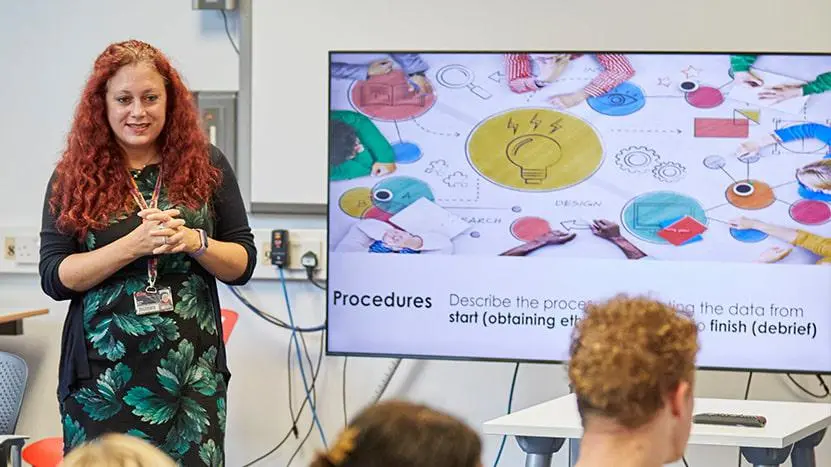
“I think university life helped me to develop my confidence and independence which readied me for the start of my career.”


Combine your skills in psychology and counselling to influence behaviour change and recovery on our BPS accredited degree.
Contact international admissions
Email: Call:This course is accredited by The British Psychological Society. The curriculum explores the scientific methods used to assess, understand and address various psychological issues - such as depression, psychosis and post-traumatic stress disorder - and the risk factors related to the development of psychopathological disorders.
Students build an understanding of counselling and psychotherapy theories, examining the latest advancements and techniques, and exploring the role of empathy, compassion and mindfulness in counselling.
As well as studying the core principles of the application of psychology within the context of counselling and mental health, students are able to specialise in their final year in fields such as behaviour change, applied psychopathology, CBT and mindfulness-based approaches, and psychology and technology.
Students have opportunities to present at and attend psychology conferences. Charities and private companies provide live briefs and mentoring for specific units.
Recent guest speakers have included a sleep laboratory researcher, police advocates, practicing counsellors, and a specialist reading intervention teacher.
If you’re looking to study our psychology with counselling and mental health degree but don’t have the relevant qualifications or experience, the social sciences foundation year will help you develop the core skills and knowledge to progress. Find out more about the social sciences foundation year.
Accredited by:

Approved centre

This course is ideally suited to those who wish to pursue a career in clinical or counselling psychology, mental health support or psychological wellbeing.
The course has a strong focus on employability and students have the opportunity to carry out a work placement in their final year, helping to gain vital practical experience and increasing industry connections.
The course provides an excellent starting point for further specialist training in clinical or counselling psychology, mental health support, social work or psychological wellbeing. It can lead directly onto postgraduate training if students wish to work towards registered or chartered status as a psychologist.
Hear from Solent alumni about where their careers have taken them and how studying at Solent prepared them for their future.

“I think university life helped me to develop my confidence and independence which readied me for the start of my career.”

The course team have a wide range of professional expertise and experience, undertaking both research and applied consultancy projects throughout their careers. Their interests include forensic psychology, sports performance, psychological wellbeing, adolescent attitudes to alcohol, behavioural interventions for autism, the impact of hearing impairment in the classroom, parent–child bonds and romantic relationships.
The University cannot guarantee any particular members of staff will teach specific aspects of the course in the future, but will endeavour to ensure the teaching team maintains their balance of experience and qualifications.
Students on this degree have full access to our range of specialist facilities, including experimental cubicles, specialist psychophysiological recording equipment and eye-tracking facilities.
Our vibrant campus brings state-of-the-art facilities to enhance your learning and elevate your student experience. Our award-winning teaching building, The Spark is centred around students and offers a stimulating study environment with flexible learning spaces. Away from studying, why not try out the gyms, fitness studios and sports halls in our £28 million Sports Complex, or watch a blockbuster film at our student-run cinema with Dolby Atmos audio.
This module explores human development from neonatal stages through to end of life. It covers the progression of developmental processes throughout the lifespan, identifying both typical and atypical trajectories and the factors that influence these developments, such as genetics, environment, and societal factors. Central to the module is the exploration of 'mind' and 'behaviour' from a developmental perspective. This involves studying how cognitive functions, emotional responses, and behavioural patterns emerge and transform as individuals grow and age. You will explore key developmental stages, including infancy, childhood, adolescence, adulthood, and old age, with each characterised by unique psychological and physiological changes.
In our day-to-day lives we tend to make judgements about human behaviour in a subjective manner using anecdotal evidence. You will be introduced to qualitative and quantitative research approaches used in psychology to study human behaviour in an objective and systematic way. This will enable you to make informed decisions as to people’s actions and motivations.
By knowing more about the research process that is used to study psychology and the basic steps that are used, you can better understand the process researchers go through to arrive at conclusions about human behaviour. This module will develop and enhance your skills in conducting data analysis from both a qualitative and quantitative perspective.
You will be introduced to a range of therapeutic approaches. Alongside the academic knowledge, being able to put the knowledge into practice through roleplay will be essential to developing and honing your counselling skills. These skills may include empathy, non-verbal communication, communication skills, appropriate tone of voice and pacing. You will also learn to reflect on these skills and how you have progressed over the course of the module.
How do we respond to stress, pressure, and other’s expectations? How do we communicate with our peers, tutors, and employers? How do we identify areas in need of work, and how do we know if we are ready to grow and develop? You will explore several areas of concern: values & attitudes, emotions & behaviour, and relationships & communication. This is important because central to a clinician’s safe practice is the art of self-reflection: the ability to notice one’s internal and behavioural reactions to events, their consequences for the self and others around them, and how to change one’s attitudes and behaviours into evidence-based, measured, effective, and empathic responses, to meet the pressures and demands of their personal and professional lives.
You will be introduced to major perspectives which exist within psychology, for example psychodynamic, behaviourist, cognitive and biological perspectives. This will enable you to establish an understanding of the origins and history of research within psychology and have awareness of the fundamental assumptions that each perspective holds. You will be able to see the continuity and development of psychology as a scientific disciple over time and understand the places of differing perspectives in psychology today.
You will gain an overview of brain anatomy and how processes are localised to different areas or structures. You’ll also learn about the way that our nervous system is structured to help us interact with the outside world or respond to internal sensations such as pain. We look at different cognitive functions such as memory, attention and thinking, using case studies to explain what happens when the brain is not functioning correctly, and consider a variety of research methods, from brain imaging to problem solving and exploring how drugs affect behaviour.
You will navigate the different ways in which social psychologists make sense of the human mind and behaviour and how psychological research can help us addresses real-life issues. How much influence does personality have on the actions we take and the ambitions we hold? How do other people's actions impact our behaviour? Social psychologists seek to understand human behaviour and how others influence our thoughts feelings and behaviour, and applicability to our daily social interactions and decision making.
This module further develops your understanding of theoretical and practical issues concerned with psychological research and will enable you to advance the skills required for the conduct of investigations and the presentation of findings. You will acquire knowledge of investigation design and methodology with associated essential techniques (such as a variety of statistical and/or qualitative techniques) that are applied in empirical research.
In this module you will cover some more research techniques and you will be given a little more freedom to select and design your own mini-project related to Counselling and or Mental Health. By the end of this module you will have all the skills necessary to begin designing your dissertation next year. You will also have had experience at designing your own study and how to overcome issues associated with taking a project from the idea stage to successful completion.
You will enable you to develop academic and practical skills in relation to counselling. The academic knowledge that you will develop from this module will serve as a basis for further exploration and understanding of counselling in level 6 and potentially beyond. The practical skills that you develop will be useful for a range of clinical and non-clinical applications e.g. applications for postgraduate psychotherapy courses or demonstrating interpersonal communication skills to employers.
With more awareness of mental health issues, there is an increasing focus on how to support wellbeing. Positive psychology focuses on optimal human functioning and what makes life fulfilling. Although the positive side of human functioning is often neglected within psychology, this is not so for developmental psychologists who typically focus on adaptability and positive functioning. This module explores how taking a developmental perspective can aid our understanding of how to live well at every stage of life. The aim of the module is to develop your psychological literacy, the ability to apply what you know from studying developmental psychology in your first year, to understanding how positive psychology can improve wellbeing. You will explore how positive psychology techniques can help people flourish throughout the lifespan, and how you too can lead a flourishing life.
Though you have developed your core theoretical and practical skills in counselling, you will need to understand how they are used within the context of clinical and counselling practice. This module will provide you with opportunities to learn how counselling theory and skills are applied in the therapy room, within supervision, reflection, and the professional and ethical issues routinely navigated in practice. Similarly, this module will allow you to apply and assess your counselling skills in a real-world context, further enhancing your CV and portfolio, to potentially increase your employability in mental-health settings.
How and why do psychological disorders develop? What keeps them going? And how do we use this knowledge to intervene with evidence-based treatments that work? You will explore the importance of psychological processes in the experience of mental illness, and the role of behaviour and emotion in current trends with a particular focus on the link between research, theory, assessment, and intervention. This module will provide you with a rare opportunity to develop some of the clinical knowledge and understanding required of mental health practitioners working in primary care and prepare you for a range of mental health training roles.
Is there an area of psychology that really interests you? Is there a psychological study that you’d like to replicate? Is there a psychological topic that you think is under researched that you’d like to investigate? If so, then this is the module for you! This module allows you to independently research an area of psychology that really interests you and gives you the opportunity to enhance and showcase the psychological knowledge you’ve acquired and the research skills and ethical understanding you’ve developed throughout your degree course. This module allows you to independently conduct and write up a piece of psychological research. This will require you to research an area of psychology of your own choosing.
How do anxiety and depressive disorders develop? What keeps them going? And how do we use this knowledge to intervene with evidence-based treatments that work? This will be the subject of your learning. In this module, you will explore the history behind CBT’s development, the theory that underpins the intervention, and some of the common misconceptions about the approach. You will explore the process of assessment, formulation, treatment planning, intervention, and how to evaluate whether treatment is working, and how to keep it working. The module will provide you with a rare opportunity to experience and develop some of the skills required of clinicians and prepare you for applying to clinical or counselling training.
Please note: Not all optional modules are guaranteed to run each year.
As technology becomes ever more sophisticated, our lives become more entwined and shaped by the technology which we build. The online world is seen by many as a separate yet wholly real world to live in and mange. Despite this, our understanding of the impact technology is having on psychological functions is lacking. Media focus on the role of technology is usually negative, discussing issues such as the online addiction, Instagram promoting self-harm, and video games increasing aggression and explicit violent behaviour. Research has shown technology has positive impacts as well such as being able to remain connected to loved ones and family members, access essential health interventions such as e-therapy, and evidence that video games can improve rather than hinder cognitive function.
You will gain an overview of the psychology behind animal behaviour and explore the fundamentals of human-animal interactions. Theories and models of animal behaviour will be introduced, and the impact of animals on peoples’ psychological states, behaviour and mood will be explored. You will explore animal behaviour from an evolutionary perspective to understand the proximate and ultimate causes of a variety of animal behaviours, such as mating behaviours, communication, and social behaviours. You will then be challenged to consider animal cognition and how animals and humans can have successful and mutually beneficial interactions.
Mindful living has been linked to good mental health, good physical health, and improved wellbeing. Mindfulness now underpins several therapeutic-approaches. Having an embodied personal practice enables you to develop your own understanding of mindfulness and to authentically teach mindfulness to clients and service users. This personal understanding will change the way in which you engage with the evidence-base for mindfulness-based approaches.
You will learn about the impact of psychological research on education. We will explore psychological research within the classroom, at school level and outside of the school environment. Topics may include SEND, managing behaviour, Autism Spectrum Disorders, bullying, inclusive education and enhancing school readiness in pre-schoolers. We will consider a wide range of educational environments from pre-school to University. The aims of this module is to provide a strong foundation on how key cognitive, social and developmental theories have influenced the field of educational psychology over the years, and how such theories can be applied to educational settings to enhance learning and teaching. There will be a strong focus on critically evaluating relevant empirical research and its applications to educational environments.
Critical Psychology is a loose term that encompasses a variety of approaches that question the extent to which psychology can be objective. Such approaches aim to expose the distinction drawn between qualitative and quantitative research as a false dichotomy. In doing so, it offers a critique of mainstream, positivist psychology. An important aspect of the critical approach is that it seeks to identify the ways in which psychological practises help to perpetuate unjust power relations inherent in industrialised, post-colonial practises. Of course, critical psychology is itself part of psychology, and we will focus on the topic of reflexivity of the researcher in trying to establish psychological truths.
Changing behaviour is central to many of the key problems our societies face. This module looks at behaviour change theory and research and applies these to real world issues. This module aims to equip students with theoretical and practical knowledge required to enable students to effectively identify, analyse and apply the principles of behaviour change in practice. The focus will be on understanding and implementing behaviour changes in applied settings, and students will be encouraged to apply their skills and knowledge to their own areas of interest.
Crime and punishment is an expansive topic, relevant to all of us in different ways. The reach of psychology in this field is extensive, encompassing the study of both criminals and those involved in the criminal justice system, as well as broader issues in society. This module will explore various areas of theory and research in psychology in the forensic field, with an emphasis on understanding the different sides of the debates triggered by such research. We will take an in depth look at some of the controversies in the forensic field since psychologists began taking an interest in it and develop a ‘critical’ understanding of the role psychology in today’s criminal justice systems and in wider society.
Contact international admissions
Email: Call:Solent’s curriculum framework builds on our unique, creative and applied approach to teaching. The transformation of students’ lives is at the heart of our mission as a university, and our curriculum – informed by the latest theory – reflects this shared educational vision.
Find out more
The student achievement team are on hand to help you succeed during your studies at Solent. They aim to contact you at key times during your time here with personalised information, advice and guidance, by email or phone.
The disability advice team provides information, advice and guidance for disabled students.
All students can access Succeed@Solent, Solent's online guide to getting better grades. It offers extensive, practical information and advice on topics such as academic writing, research and presentations.
Studying psychology gives you a broad range of skills that can open up opportunities with a wide variety of employers. Around two-thirds of psychology graduates are in employment in the UK six months after graduating, while almost a quarter undertake further study or combine further study with work.
The scientific aspects of Solent’s psychology programme provides useful tools for careers in healthcare, law enforcement, finance, IT and research. Postgraduate study and training is essential if you want to become a chartered psychologist or register as a practitioner psychologist with the Health & Care Professionals Council (HCPC). Roles could include mental health support worker, psychological wellbeing practitioner, assistant psychologist, therapeutic practitioner, research assistant,NHS information analyst.

Typical salary: £43,742 to £50,056
Starting salaries for trainee psychotherapists* in the NHS usually start at around £35,392 (Band 6 of the Agenda for Change (AfC) pay rates). Qualified NHS psychotherapists typically earn £43,742 to £50,056 (Band 7). Rates for practice work are typically between £40 and £100 per session.
*To practise as an adult psychotherapist, you should complete an accredited psychotherapy training programme. The UK Council for Psychotherapy (UKCP) accredits a number of postgraduate psychotherapy training programmes.
Starting salary: £33,706
Trainee high intensity therapists* usually start on £33,706 (Band 6) of the NHS Agenda for Change (AfC) pay rates. After qualification, salaries within the NHS progress to Band 7, which ranges from £41,659 to £47,672. With experience you can progress to senior roles that include additional management and specialist responsibilities. Salaries at this level (Band 8) range from £48,526 to £65,262.
* To practise as a high intensity therapist you'll usually need to complete a British Association for Behavioural and Cognitive Psychotherapies (BABCP) Level 2 accredited postgraduate diploma in cognitive behavioural therapy - high intensity IAPT.
Typical salary: £40,057 to £45,839
Counselling psychologists* starting as a trainee within the NHS will typically be on band 6 of the Agenda for Change (AfC) Pay Rates, which ranges from £32,306 to £39,027. Once qualified, salaries typically range from £40,057 to £45,839 (band 7). Salaries for senior psychologist roles can rise to between £47,126 and £53,219 (band 8a).
*To practise as a counselling psychologist in the UK you must be registered with the Health & Care Professions Council (HCPC), which involves training at postgraduate level.
The stated salaries are published on prospects.ac.uk.
Hear from Solent alumni about where their careers have taken them and how studying at Solent prepared them for their future.

“I think university life helped me to develop my confidence and independence which readied me for the start of my career.”

The Solent Careers team is committed to getting students into great careers.
While you are studying, the team can help you with finding work experience or placements, link you with a mentor, check your CV, or offer one-to-one guidance.
We also have graduate job opportunities just for Solent graduates.

6th
UK uni for sustained employment
Longitudinal Educational Outcomes, 2022
Every student at Solent University will also have the option to study an additional Certificate in Practical Artificial Intelligence qualification alongside their course. Free of charge, the course ensures you'll be prepared for a fantastic and varied career after graduation.

The tuition fees for the 2026/27 academic year are:
For further information, please visit our tuition fees page.
While most course costs are covered by your tuition fees, some essential resources and optional extras may need to be paid for separately. These additional costs are listed below. For advice on budgeting and managing your money, please contact student.funding@solent.ac.uk.
The 2026/27 additional costs are not yet available. For guidance, previous additional costs have been:
Compulsory costs
Solent University offers a range of bursaries and scholarships that provide financial assistance or waive fees for tuition or accommodation. Each bursary or scholarship has specific eligibility criteria. Check out our bursaries and scholarships pages to find out more.
Cost of living support
At Solent, we understand that the cost of living crisis may be of some concern. To help, we've put together some detailed information to show what support is available and how to make your money go further.
Graduation costs
There is no charge to attend graduation, but you will be required to pay for the rental of your academic gown (approximately £45 per graduate, depending on your award). You may also wish to purchase official photography packages, which range in price from £15 to £200+. Graduation is not compulsory, so if you prefer to have your award sent to you, there is no cost. Extra guest tickets will go on sale after results publication and will be sold on a first-come-first-served basis. The cost per ticket is currently £20. Please note, we do not guarantee there will be any extra tickets available to purchase.
Contact international admissions
Email: Call:Please select an option below:
As a general guide, we look for qualifications that are equivalent to the British high school A-levels.
If you are applying from outside the UK, find information about entry requirements, visas and agents for your country here.
For further information about EU qualifications, please see our course entry requirements document.
For international students who do not meet the direct entry requirements for this undergraduate degree, our trusted partner, QA Higher Education offers the following pathway programme designed to develop your academic and English language skills:
As a general guide, we look for qualifications that are equivalent to the British high school A-levels.
If you are applying from outside the UK, find information about entry requirements, visas and agents for your country here.
For further information about international qualifications, please see our course entry requirements document.
For international students who do not meet the direct entry requirements for this undergraduate degree, our trusted partner, QA Higher Education offers the following pathway programme designed to develop your academic and English language skills:
All international applicants need to be aware that the English language requirements to attend Solent University, and the English language requirements to obtain a visa from the Home Office, may be different. This means that if you meet the Solent University language requirement to gain a place on the course, you may still have to meet additional requirements to be granted with a visa by the Home Office.
We strongly advise all applicants to visit the Home Office website which outlines all the requirements for a successful visa application
Full-time
Any student applying for the first year of a full-time/sandwich undergraduate course must apply through UCAS (University and Colleges Admissions Service). This includes mature, overseas and EU students.
Nearly all schools and colleges offer their students the facility of applying electronically through the UCAS website using 'Apply'; it may also be used by those applying independently in the UK and overseas. This facility and all course information can be found on the UCAS website: www.ucas.com.
Your application should reach UCAS by 31 January if you hope to enter a course the following autumn. Early application is advised for the most popular subject areas. Late applications may be made until the end of June. The UCAS Code for the University is S30, code name SOLNT.
Find out what happens after you apply
Contextual offers
Solent endeavours to offer learning opportunities to students from all backgrounds. When we receive and review an application, we take into consideration the context and personal circumstances of applicants when making a decision, which means our advertised entry tariff could be reduced.
Find out more about Solent's contextual offers
Applicants who do not have English as their first language will be required to demonstrate an approved level of proficiency in the use of the English language. The agreed minimum requirements for this course are:
Qualifications are checked before enrolment, and international students must bring their original certificates or certified copies when coming to study at the University.
Pre-Sessional English programme
The University also offers a pre-sessional English programme for international students who wish to improve their level of English before starting a degree course.
Contact international admissions
Email: Call: